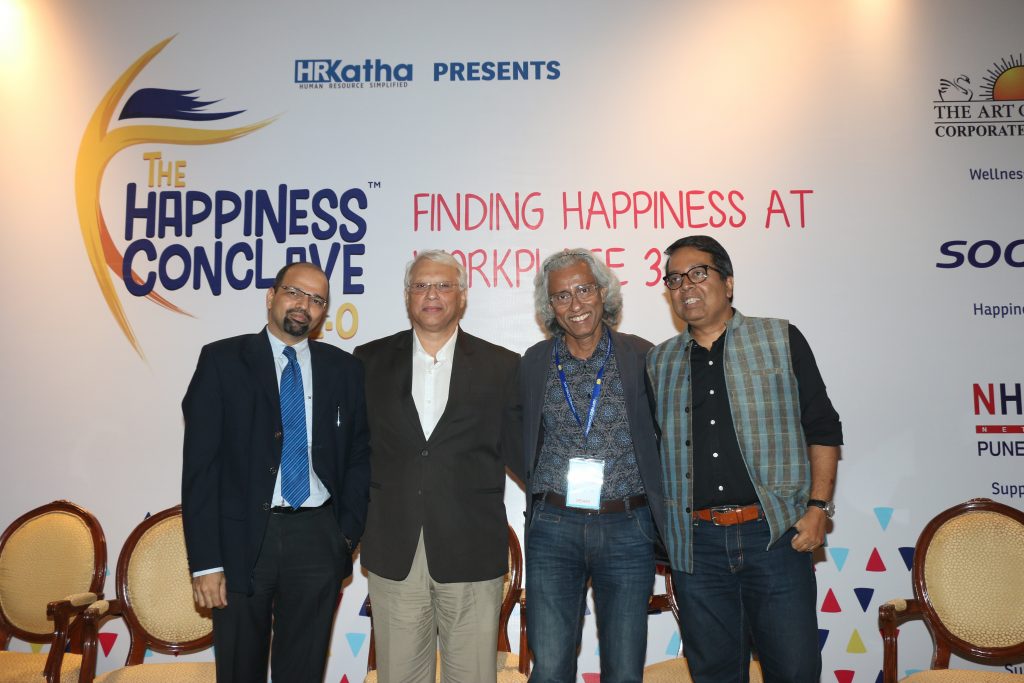We are living in interesting times with not just changes but unpredictability in different dimensions impacting society, organisations and individuals.
Happiness is subjective, but while people themselves strive to find true happiness in these stressful times, organisations are also including employee happiness as an important agenda in their strategies to improve performance and productivity.
However, how does one balance performance pressures with employee happiness in an unpredictable business environment? How do business leaders and CEOs look at it? What are some of the factors that need to be considered?
The Happiness Conclave 2.0 organised by HR Katha, held in Mumbai on March 24, had a panel of CEOs discussing the topic—‘CEOs’ take: How senior leaders can build and maintain a high-performing and yet happy work environment’.
The panel for this session had Dr. Bhaskar Das, president, chief growth and innovation officer, Zee Unimedia; Partha Sinha, vice chairman and managing director, McCann Worldgroup, and Adil Malia, CEO, The Firm, as participants, while I moderated the same. Interesting perspectives emerged on happiness as seen at various levels, such as individual happiness, organisation happiness and social happiness.
We need to continuously contextualise happiness amidst the turbulence in the larger eco system, wherein the individual and organisation need to adapt and reorient on a continuous basis.
We are living in interesting times with not just changes, but unpredictability in different dimensions impacting society, organisations and individuals. All agreed that the primary objective of the organisation is to create value for stakeholders and as role holders one needs to be focussed on the same. However, there were differences amongst panel members on the degree and level of organisational role in employee happiness.
One view was that the role of the organisation is to create a positive environment for employees; an environment, which will enable them to perform their role in line with the purpose and ambition of the organisation. The other view that emerged was that the organisation needs to play a more involved role to ensure that different dimensions (macro and micro) impacting the individual happiness are taken care of. Perhaps the answer lies in contextualising it to the firm’s eco system.

A question that the panel sought an answer for was—Is happiness a critical value differentiator or is it something that is good to have? While logically it appears that happiness leads to greater productivity at various levels, more study needs to be done to validate the relationship and also to ‘affirm the consequent’. Additionally, it was felt that one needs to keep in mind the larger societal happiness. Happiness at a micro level (individual and organisation) cannot be dissociated from that at a macro level (social happiness).
Given the magnitude of changes taking place, we need to continuously contextualise happiness amidst the turbulence in the larger eco system, wherein the individual and organisation need to adapt and reorient on a continuous basis. And ultimately, at an individual level, the ‘pursuit of happiness’ is illusionary—happiness can never be a destination nor can it be demanded. It is an ‘individual choice’ and ‘a journey towards the purpose’.
The panel ended the discussion by bringing in the spiritual dimension to individual happiness, wherein happiness is seen as a result of internal peace, which arises from a deep level of self-awareness. Can Individuals explore the same? Can organisations facilitate the same?
(The author was a moderator at The Happiness Conclave 2.0, and he is currently managing partner and country head, InHelm Leadership Solutions)
(Sodexo, Art of Living Corporate Programs, XLRI, NHRDN Pune, NHRDN Mumbai, XoxoDay and Kommune are partners for The Happiness Conclave).



